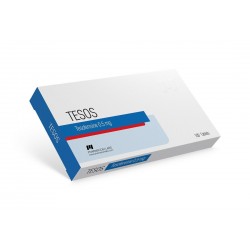



Tesofensine 0.5 mg / pill, 100 pills
 Security policy
Security policy
Excellent customer support, high quality products and secure shipment.
 Delivery policy
Delivery policy
Fast tracked Global Shipping. Discreet packaging.
 Payment
Payment
We accept Bank Transfers, PayPal and Bitcoin. Payment info is emailed after you place your order.
Tesofensine is a unique new-generation Triple Serotonin Norepinephrine Dopamine Reuptake Inhibitor (SNDRI) that is utilized for the treatment of obesity. Tesofensine primarily acts as an appetite suppressant but possibly also acts by increasing resting energy expenditure. SNDRIs belong to the class of psychoactive antidepressants. They affect neurotransmitters in the brain, specifically serotonin, norepinephrine, and dopamine. The effects of tesofensine in the brain promote the feeling of maximum satiation during eating and significantly reduce appetite. Tesofensine also indirectly potentiates cholinergic neurotransmission and may have beneficial effects on cognition, particularly learning and memory. Sustained treatment with tesofensine has been shown to increase BDNF levels in the brain and may possibly have an antidepressant effect.
Tesofensine was originally developed and patented by NeuroSearch A/S (Denmark) to cure Parkinson's and Alzheimer’s diseases. However, weight loss was consistently reported in the original studies, especially in overweight or obese patients; therefore, it was decided to develop tesofensine for the treatment of obesity.
Notably, Tesofensine has the following effects:
• Acts centrally, suppresses appetite, regulates the availability of dopamine receptors, and stimulates α1-adrenergic receptors.
• Appetite decreases within 14 days; there is a higher level of satiety and less desire to eat. • Increases significantly fat oxidation and reduces adipose tissue.
• Improves the level of insulin sensitivity, which leads to a higher glucose metabolism. • Alters the expression of dopaminergic receptors in the striatum of the brain, as well as their binding. • The energy consumption increases greatly within 14 days.
• The drug has a long half-life of 8–9 days and is metabolized mainly in the liver by CYP3A4 to the disalkyl metabolite M1 (NS-2360), which is the only metabolite found in human blood plasma.
Safety warning: Always consult with a qualified healthcare provider before starting any new supplement regimen, especially if you have existing health conditions, are pregnant, nursing, or taking other medications. It is your responsibility to consult with your healthcare provider to determine the appropriateness of any product or supplement for your health needs. All healthcare decisions should be made in consultation with a qualified medical professional familiar with your personal health situation. Use of this website implies understanding and agreement that all information is solely for informational purposes and not a substitute for professional healthcare advice.